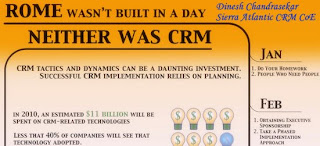
Dears,
CRM advocates to potential CRM buyers a disservice when they use industry-insiders' jargon to explain its benefits. Instead of speaking about features and functionality in software-application terms, they should talk about benefits in business terms. Most businesses are engaged in CRM -- they just don't use that acronym, and they don't yet know how a unified CRM system can work for them.
CRM advocates to potential CRM buyers a disservice when they use industry-insiders' jargon to explain its benefits. Instead of speaking about features and functionality in software-application terms, they should talk about benefits in business terms. Most businesses are engaged in CRM -- they just don't use that acronym, and they don't yet know how a unified CRM system can work for them.
Those of us immersed in CRM take it for granted that people understand what the acronym stands for and what it really means -- the technology, people and processes that go into building stronger relationships with customers, or customer relationship management. Quite naturally, the people who sell, support and comment on CRM understand all of that. But do the intended users?
I tend to talk about CRM a lot outside my professional circle, and it astounds me that so many people haven't the slightest notion what "CRM" means. In many cases, I'm talking to Small & Medium Business owners who could benefit directly from a CRM system, and who have been the targets of many a big-budget marketing campaign over the last several years. For whatever reason, the message has yet to penetrate the consciousness of a vast percentage of decision makers.
Yet almost to a person, these Small & Medium Business owners are confronting the issues at the core of CRM -- lead generation, customer service, customer loyalty and sales information management, among others -- and handling them through home-grown and usually totally unconnected systems. In many cases, it never occurs to them that they are practicing CRM. These are simply the activities they need to do to run their businesses.
Tuning Out
As a result, these companies create ad hoc on-line and off-line solutions, or they implement simplified technologies -- like low-end SFA -- that are expedient but create silos. Information is never shared or fully exploited, and the issue tends to fester until a company grows too large to ignore what is by then an extremely thorny problem.These are the conditions that led to the creation of CRM in the first place -- why are they still afflicting businesses today?
Part of this is due to the de-evolution of the concept of "CRM" from a business-wide philosophy into a software sale. It makes sense, to a degree; the organizations at the forefront of the CRM movement, out of economic necessity, have been the vendors who stood to profit from that activity. Unfortunately, the result is that the CRM argument fades into the din of other enterprise software sales pitches.
Small & Medium Business owners get a lot of these, and the natural tendency is to tune all of them out -- including those for concepts like CRM, which could transform their businesses.
How can vendors and service providers stand out in this environment? By reframing the CRM story in ways that Small & Medium Business owners can understand. The jargon needs to take a rest, while the results of an integrated approach to managing customer relationship information come to the fore.
Talk Business
The argument should not initially be about software delivery models or IT considerations, but about the impact on business. That means the impact of a well-tracked marketing campaign on sales, the impact of arming salespersons with customer data at the start of the selling cycle, the impact of data collected by sales staff on the service and product development processes, and the translation of all the results into marketing.
Small businesses understand segments of that cycle, but they can miss the forest for the trees. It's crucial to explain the power of a unified solution in the context of the business, not in the context of the technology.
Reaching this coveted untapped segment of the CRM market is tough for vendors, who are expert at selling software and services, not at helping potential customers re-imagine the role of data in their businesses.
It's also tough for the CRM media, which often defaults to the language of the vendor instead of the language of the user. In both cases, the answer is to employ one of the basic tenets of CRM: Work with the customer the way the customer wants to work.
By taking a step back and understanding how Small & Medium Business users view their sales, marketing and service issues, and then talking about solutions in terms they understand, the CRM community can reach small businesses with messages that resonate about a solution they need -- even if they don't call it "CRM" yet.
Good Luck
Your P&C
DC*

Here are additional easy to understand reads that will compliment this article nicely. http://www.intelestream.net/en/whitepapers/whitepapers.html
ReplyDelete